#aph--carthage
Note
Okay but enemies to lovers Iberia x Carthage ??
I'm interested 👀
Pretty much, yeah!
Carthage invaded Iberia to get to Rome. Her defeat was a means to an end and she hated him for it. All her life she had trained for war, and she failed to an outlander!
Carthage was powerful, smart, his navy was the best in the Mediterranean. He knew Rome's greed for expansion would mean all of them would get conquered sooner or later, so he made a deal with Iberia: Rome was their common enemy, why not join forces?
So they trained together, fought together, they grew closer and closer, to the point they were saving each others lives in battle and tending to each others wounds.
Iberia couldn't pin point the moment the sight of Carthage wounded made her heart ache with fear. Or why when he told her to go back home and not fight because it was too dangerous she felt her heart break.
They never named what existed between them. It remained unamed, unspoken.
12 notes
·
View notes
Text
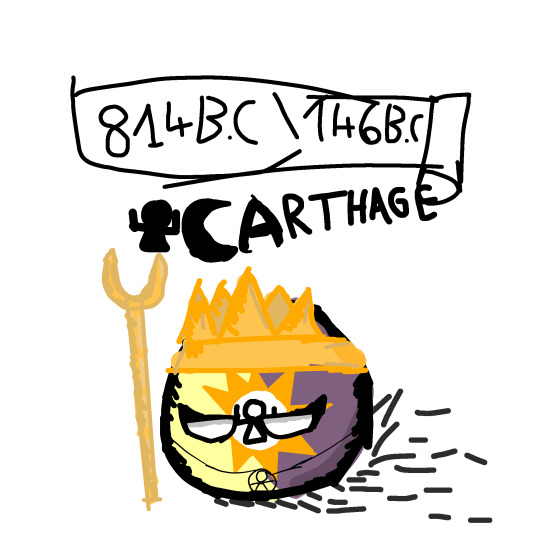
One for my country 🇹🇳 anyways follow me on TikTok XXX_whoiam_XXX
13 notes
·
View notes
Note
bless that mf roche content 😤😤👌👌
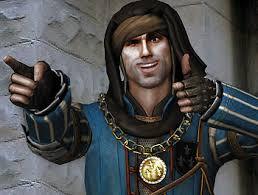
11 notes
·
View notes
Note
ROME GOT NO BUSINESS LOOKIN LIKE A SNACC
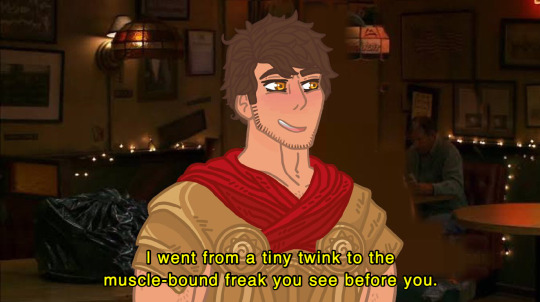
drink milk kids n grow up big n stronk like roma
this scene in: It’s always sunny in philadelphia italia™
#aph rome#more art coming soon dear children#aph--carthage#always sunny in philadelphia#what kinda fucking milk he drink?#chocolat milk with extra anabolics#show yourself and your roman thotting ways anon#i am in awe of the size of this lad#absolute dilf unit
78 notes
·
View notes
Note
Hi There!🧡
I've seen your ancients related post,and I like how you added many ancient kingdoms/empires as well as some tribes that were usually left out in hetalia (and history class in general) such as Numidia.👀
So do you mind telling us more about Numidia?As well as his relationship with Carthage and Maurusia (kingdom of Mauretania)?
Can do!! A lot of this garnered from conversations I had with the lovely @recbeetch who has some fascinating insights on the ancient Maghreb ♥

(Note: You may notice that compared to my original "The Known world according to Rome" map, Numidia has lighter skin here than he does there. This is because the Numidians are generally considered to be a Mediterranean people, as well as the ancestors of the modern day Berbers, Amazigh, and other groups present in Morocco, Algeria, and Tunisia. In the interest of accuracy, I wanted to make him resemble Mediterranean people and his descendants more. His original design specifically looks very Sub-Saharan African, and while Sub-Saharan Africans were certainly present in the Mediterranean, there's a great amount of physical differences between the Numidian people (and their descendants), and say, the people of Kush or Aksum! Hope this makes sense 🙏)
Now, historically Numidians had a reputation for being treacherous because they switched sides so often, though their reasons for switching sides are a lot more complicated than "pay me more" (like in the joke above bahaha) Numidia (who represents the Massylii) was a very crafty dude who was always looking to outplay his opponents, and tried to get as much leverage as he could out of his reputation as a skilled cavalryman for his own goals. On first glance, he's an unassuming dude, not particularly flashy or loud. He's used to people underestimating him, whether it because they considered him a provincial desert nomad or because it was often his sister Masaeyli who eclipsed him in stature and grandeur. However, he perhaps started overestimating his own capabilities later in his life, especially under Jugurtha's reign.
Masaeyli: (There's almost no information on the Masaeyli...) Their relationship is the closest he has to "immediate family." As stated earlier, she was the more outspoken and expressive out of both of them. They both resisted against, served as mercenaries for, and deeply resented Carthage, keeping them united on that front. As their world expanded however, and they saw more and more, they began to drift apart from one another. During the Mercenary War, both of them allied with different sides in hopes of furthering their own goals. I'm not sure what 100% they were doing during Hamilcar and Hannibal's Iberian misadventures, but right before the conclusion of the 2nd Punic War, their relationship was worst it'd ever been. Though idk rn when she specifically died, he was largely responsible for her death, annexing her lands and absorbing her people into his own.
Carthage: They have something of a mixed relationship- he and Masaeyli fiercely resisted when Phoenician settlers first landed in what would become Carthage, and they even managed to kick her around for a solid bit, as these earlier Carthaginians paid tribute to the nearby tribes. He served under her as a mercenary, and travelled to a lot of places fighting for her interests (because Carthage would never fight herself when she's gotz business to do) Their relationship is something of a combination of "asshole boss" and "begrudging enemy you can't help but respect", as he would later adopt many of her practices in his own lands, like agricultural practices and sedentary lifestyles. After the 2nd Punic War, he took full advantage of his alliance with Rome to beat her up as much as he could.
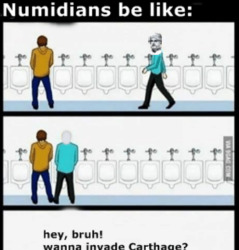
Maurusia/Mauretania: He wasn't also close/familiar with them (gender undecided) as he was with Masaeyli, as geographically, he was just much farther away from Maurusia than Masaeyli. However, he considered them a valuable ally during some of his greatest times of need, as Masinissia, the Massyli King who would defeat the Masaeyli and switch sides from Carthage to Rome, appealed the Mauri king Baga for aid. Despite Maurusia refusing to get involved in the 2nd Punic War, they agreed to provide him aid against Masaeyli. Their relationship later soured as his ambitions elicited more and more wariness. Despite this, they still allied with him in the Jugurthine War, but ultimately, ended up betraying him in exchange for territorial gains. There's something poetic to be said about just as how Massyli cemented his kingdom by betraying Masaeyli and Carthage to Rome, Maurusia too carved out their kingdom through similar treachery, but I'll settle for this meme instead.
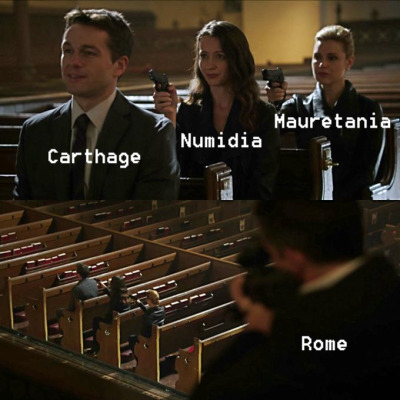
Not superrrr sure whatever they were exactly up to under Roman rule, so this is very much informed by recbeetch!! Numidia def continued to cling on to his identity, despite being conquered by Mauretania, who began to wonder whether their choice to defect to Rome really was the correct choice in the end when they was the only independent North African polity left and Rome continued to menace them for the rest of their days, before the modern day Maghreb nations rose to take their places.
#hws numidia#hws carthage#hws mauretania#hws rome#hws masaeyli#hws massylii#hetalia ocs#hws ancients#aph ancients#historically inaccurate hair is historically inaccurate#historical hetalia#woof thats a lotta drama rama innit#long post#aph numidia
108 notes
·
View notes
Text
Personal rant
This is a personal rant about Spain’s history and some people’s interpertation of it, mostly regarding some of the “nations”, or “ethnic groups” that are sometimes considered Spain’s parents. If you think it can affect you personally, don’t continue reading.
I really do not understand people who consider Spain’s father figure anyone other than Rome. Like... literally, no one makes any sense other than Rome. I could buy Visigoth acting as Spain’s father figure, or as his “tutor”, and I could even understand (though in no way share) the idea of Castile and Aragon being Spain’s “parents”. Though, again, I would not share that hc either, because even if the current nation-estate of Spain is “younger” than the many different medieval kingdoms, the notion, the “idea”, the “identity” to some extent, of Spain is way older than any of those medieval kingdoms which, technically, were not nations nor modern estates either, so acting as if Spain came to be out of the blue in the 15th century, as if there had not been already a clear Spanish identity and notion of unity and nation prior the 15th/16th centuries is just... ignoring all the evidence. What I trully do not understand is when people have Al-Ándalus, Umayyad, or even Carthage, as Spain’s father figures. It is true that history can be interpreted in many different ways, more so when it comes to Hetalia, but there are some interpretations that... they just make no sense. Not from a historical point of view, at least. Guess you can have whatever headcanons you want, but historically speaking, they may make no sense whatsoever. And that is exactly the case with these interpretations.
For Al-Ándalus and Umayyad the reason why it is utter nonsense for any of them to be Spain’s father figure is that they are literally everything Spain is not (and did not want to be). In the first years of our lives, until we become adults, we all build our identity against the others. Something similar happens with the different nations. They build their identity partially based on not being like the neighbour next door. We could say that Spain built itself against precisely these two guys up there, Al-Ándalus and Umayyad. One could think, “okay, but as we all know, in many cases, the first ones we try to build our identity against is our parents, so that could further emphasise the role of those two as Spain’s paternal figures”. Well, no, and here’s why. Maybe it all comes to what I understand as a father figure, but to me, in the case of nations, the father figure, or the “father” or “mother” of a nation should be the one the nation receives more influences from. It should be to some extent the “origin” of most, or a big significant part of the nation’s culture, identity, and overall, idiosyncrasy. Either that, or it should have left a very deep impact and long lasting effect in the character and identity of that nation. And what I mean is that the nation must have adopted transcedental aspects from that “father nation” that are now rooted deep in its character. Otherwise, a deep impact could be a traumatic event like a war that people from the nation have built their national pride upon, but that’s not what I mean. I mean that the nation has actively acquired, integrated, and assimilated, deep and transcendental elements and aspects of its “father nation” culture and identity, so the “father nation” identity has, to some extent, become the identity of the “new nation”. Examples of some of these transcedental elements could be religion (and overall, spirituality), sense of justice, moral values, or even lexicon related to abstract concepts and emotions such as love, passion, fear, desire, hate, regret, etc. So here’s the thing. Neither Al-Ándalus nor Umayyad did, in any way, affect Spain in this respect. Mind, I am not saying they didn’t leave any influence in Spain at all, what I am saying is that they did not have a transcedental influence in Spain’s identity. Or they did, but just in the opposite way. Spain takes its culture, society, values, and spirituality from Rome, and builds itself against Al-Ándalus and Umayyad (quite honestly, Spain’s relationship with these two is more similar to the “traumatic” event some nations have built their national pride upon I mentioned earlier than to any father-son type of relationship). If anything, they only helped to exacerbate Spain’s loyalty to its “indigenous hispanoroman” identity. Again, not saying they left no influence, for example, some architecture in southern Spain (though, tbh, it’s more like a couple buildings people visit while ignoring the hundreds of christians and roman buildings lol), some cities, some influences in the food and some traditional dishes, some new agricultural and destillation techniques, etc. And it is well known that up to 8% of the Spanish vocabulary is of Arab origin, even though, to be honest, much of that percentage are toponyms and half of the lexicon is no longer used in Spanish today (most people don’t even know half of these words, and some have their Latin counterpart). However, none of these influences affects Spain’s psique and identity to a transcendental level. Not only that, but the people who identified as Spaniards and all its old variants (derivatives of Latin’s hispanus/hispanicus) were the Northern Christian people, never the Muslims who lived in Al-Ándalus under Umayyad rule. It was northern Christians who talked about Spain, who considered Spain their “lost” nation, and who identified with a Spanish identity, not the people nor the rulers of Al-Ándalus (for a short time, Northern Christians would actually refer to Christians living under Muslim rule in Al-Andalus as Spaniards, to distinguish them from the Muslims). And in no way am I justifying the following, I’m just stating a fact, which is that Muslims were expelled. All of them. Which means that Spain, as a nation, as the people it represents, literally has almost no link whatsoever with the people of Al-Ándalus, Arabs, nor Muslims, other than its people, the “Spanish people” fought them for centuries. Obviously, they lived in the same piece of land, though borders were never an easy place to live in, they were not 24/7 killing each other (impossible to do that nonstop for almost 8 century), they often traded, and there were Christians living in Muslim territories who adopted some Arab or generally Middle Eastern/Oriental traditions and practices that they preserved even under Christian rule (they were called Moriscos), hence the influences. But these influences are so superficial and “materialistic”, they affected so little the Spanish way of understanding the world, that I trully think it is unrealistic to make any of these two Spain’s father figure. It is almost a bad joke when you get the Northern Kingdoms singing to Spain and identifying as Spanish, getting ripped of their representation and identity, and instead, associating this identity and representation (their identity and representation) to those who never identified as Spanish and fought those who did with the intention of conquering and subduing them. And I guess you could argue that most of “Spain” (the land) was under Muslim (Umayyad) control, but as I understand Hetalia, and modern states today, it is not about land, but about nations and ethnic groups, and the people they represent, and it just makes no sense to make Spain’s father figure neither Al-Ándalus nor Umayyad, because given history, they would have probably tried to kill Spain had they got the chance, and the same goes for Spain, as it certainly would try to kill them as well. Plus, friendly reminder that the muslim territory of Spain was, for the most part, independent from the Umayyad Empire, so even if members of the Umayyad dinasty ruled over Al-Ándalus, it was not part of its empire (again, for the most part, there was a short time it did belonged to the empire). Plus Al-Ándalus was cut into pieces during the 11th century and the Arab “Umayyad” elite expelled from the Peninsula. I mean, neither the Umayyad dinasty nor Al-Ándalus lasted for 7 centuries. The Arab rulling elite (Umayyad) were expelled, and Al-Ándalus destroyed, by the end of the 11th century. So it is not true Spain received direct influence from these particular people for almost 800 years, that’s an extreme oversimplification of Medieval Spain, as Arab rule in part of Spain, as well as the existance of Al-Ándals, in reality, lasted for around 350 years, as opposed to Roman presence in Spain, which lasted for over 600 years, plus, they were never expelled and their identity completely permeated the indegenous inhabitants of the Iberian Peninsula.
About Carthage... what can I say? This just makes no sense. It may not be as ironic (and almost offensive) as the other two choices, but in some way, it makes even less sense, if that’s even possible. Not much to say about this one, I just can’t even think of one thing Spain has inherited from this guy, can’t think of any influence from Carthaginean culture or whatever in Spain. The little I can think of slightly related to Carthage is actually Phoenitian so... I mean, Cartagena, in Murcia, is a great city, but... can anyone think of any significant influence, any significant link Spain as a nation, or Spaniards as an ethnic group, have with Carthage? I’m sure people from Murcia may come up with something but... in general, I really don’t think we have anything to do with Carthagineans, as much as I like Carthage. I’m sorry, but I trully can’t think of anything Spaniards, Hispanics, even Portuguese if you want (though I’m no expert on Portuguese history so I may be wrong on this one) have “inherited” from Carthage (guess you could link the Portuguese Empire based on trade with Carthage, but realistically speaking, there’s no historical corelation there either). I guess they may have introduced some new techniques and whatnot, but, really, that happens all the time, that does not affect the identity of a group nor their way of looking at the world greatly, unless it supposes a radical change in their way of life, which did not happen, since Carthage barelly controled some strategic cities. Yes, it got to the northern part of Spain, but did not have actual control over all that territory, and there was no cohesive rule nor anything I can think of... In any case, I’m no expert on Carthage either, but I trully cannot think of any Carthaginean influence in Spain at all.
In conclusion, a nation’s “father figure” is the one that has, to some extent, “built the nation”, or “mould it”. Just like if we were talking about a human being, we should ask “how does it behave? how does it think? how does it see the world? how does it communicate? what are its values? what are its traditions?” Then ask about the origin of all those answers. And there you get the “father figure”. Spaniards speak a Latin-based language/s (but the Basques and some people from Navarra who speak a pre-Roman language), they are Christians, Roman Cahotlics to be more precise, and Spanish justice is based on Visigothic and Roman laws. Spanish culture is overwhelmingly based on Roman culture, as is its society, values, etc. The way Spanish interact with the world and others is based on a Roman perception of the world. They may be others who have influenced Spain, I’m not denying that, but none of them has, not by a long shot, defined Spanish identity as much as Rome has. The only event in history that had a significant importance in defining Spain’s identity other than Rome and getting to America, is the war against the Muslims, which includes the two listed above. But they never “added” to the Spanish identity on significant levels, for the most part they just reinforced it by acting as its antagonists, which is not exactly what I would represent as “parenthood”. Carthage... I don’t even know how that happened.
And that’s it. This is not a personal attack to anyone who has any of these headcanons, it may seem like it is, but it is not. If anything, it is an “attack” to these ideas, simply because I don’t think they accurately portray Spain’s history at all, on the contrary, they distort Spanish history based on 18th and 19th century foreigner’s ignorant and orientalist crazy theories and assumption (and anti-Catholic propaganda, tbh), and Hetalia, at the end of the day, is about history. If any one has these headcanons,you do you, go with it, but please be aware that they are not historically accurate, that’s it.
#aph spain#aph#hetalia#historical hetalia#hws spain#jesus#needed to get it out of my chest#like seriously#it dosen't make any sense#and i've been seing fanart about this for years and years#and carthage#like how???#and god knows i love carthage#but... no#just don't#If you want a pre-roman character to be Spain's and Portugal's father or mother figure#please do Iberia or Celt or whatever#I would even accept Lusitania for Portugal even though as someone from Extremadura lusitania = portugal is a glowing big ass red cross#but at least it makes some sense#even though we don't have much of pre-roman culture left we still have a tiny bit#and biologically speaking both portuguese and spaniards#and particularly spaniards#are overwhelmingly pre-roman 'people'#genetics don't lie and spanish genetic genepool is overwhelmingly native hispanic#and numancia cantabrian and sertorian wars are important in the imaginary of the spanish nation#as well as the wars led by viriatus#i went out of topic already#this is all for now
18 notes
·
View notes
Note
🐘🐘🐘
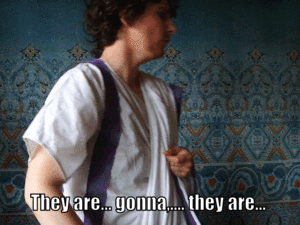
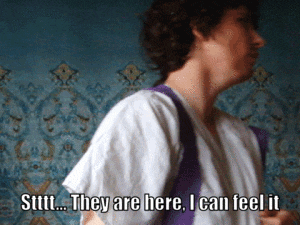
#hetalia cosplay#historical hetalia#aph roman republic#aph carthage#hannibal at the gates#romulus needs a professional#they broke him
28 notes
·
View notes
Note
Any thoughts on the 'magic' and 'magical creatures' in hetalia? The manga and anime can be so weird and vague sometimes. (But then again, what even is canon?) Perhaps ancient magic does exist, and only certain people can use it(but not always with success)? Or maybe it's all just a hallucination, and some countries need to lay off the "magic" mushrooms. (All puns intended) Sorry for the weird question, your headcanons are super interesting! I'd love to hear your thoughts!
good question! the way i interpret it, magic does inherently exist in hetalia—but in specific forms.
1. the first and most obvious dimension: the very existence of these helltalia personifications to begin with. eternally youthful, eldritch beings who cannot die? who come back from all manner of deaths and horrific injuries good as new? their very beginnings: brought to life by human imaginations and beliefs? magic. spoken into existence, in a manner of speaking. but a more subtle type of magic that simply exists—if that makes sense? rather than the Nation emerging from a group of humans specifically reciting incantations and spells.
2. the gods made flesh: in this respect, the magic of their existence will at times dovetail with many of the religious and/or magical traditions of their people’s cultures—even if it’s not always called ‘magic’, but more like ‘miracles’ (such as nations steeped in the Abrahamic tradition). or in certain cultures where the barrier between the human and divine is more ambiguous, or it’s thought that the gods could take human form—there are times that some of them were definitely worshipped as deities, or seen as human avatars with a special connection to god(s). one example of my headcanons: kiku and his association with izanagi, izanami and amaterasu in how the humans understood his existence. on the other extreme: think puritan america, the hysteria over witchcraft since people believed it was a thing—that was also additionally shaded by constructions of racial/ethnic otherness outside englishness. alfred gets certain accusations hurled at him as a child, and it isn’t pretty.
3. offensive magic: generally, my inclination is to limit the ability of any of the helltalia nations to do stuff like being able to cast magical spells (it’s not gonna be so easy for them to hurt another nation). so, in the case of arthur who is in canon, shown doing this at times—i don’t headcanon him being able to do that. not that he might not try, especially when we think of how belief in magic existed in various human cultures (from spell-casting to making charms/amulets and prophetic visions), but that it’s not a definitive ‘arthur has Magic and can use it to influence events’. with ivan and general winter: similarly, he can’t just be all like “hey go and fuck the german army up for me thanks”. but otherwise? i’m sure the nations themselves tried (think ancient nations and all those beliefs in oracles and prophecies). carthage definitely tried to curse rome with invocations to the gods carved into the naval rams of her ships.
4. nation force magic ™ and associated stuff: i see there being some very specific, sort-of-magical (though you could interpret it otherwise) abilities. nations can for example, sense another nation. this isn’t like crazy long range radar (that would take too much of the fun out of it and i need them to be able to sneak past one another at times) but let’s say, if a nation tried to pass themselves off as a normal human in close proximity—even in front of another nation who has never met them before? oh, they’d know—ah, he is One of Us. this is 100% how i see the perry expedition in 1853 going. kiku has never met alfred before and only has (garbled) descriptions and rumours, but he knows when our lad comes ashore (after very noisily blasting cannons off in the harbour on the pretext of “it’s my fucking birthday”)—without anyone having to let him in on that, yeah that one is The Nation. on other occasions—it’s this subtle, instinctive sense of predestination or foresight. they tend to be in places where Major and Important History-Changing Things happen—even if they don’t always know it clearly.
5. magical beings/creatures: oh man. okay. i love the idea that some of these actually do exist, for multiple reasons. and even if not necessarily ‘existence’ in the positivist, scientific way where someone can objectively produce evidence that everyone can see. maybe arthur can see the fae and water horses, but alfred can’t and is convinced his father is just batshit (’this is what happens when you drink before 10am’). on the other hand, arthur is perhaps skeptical about the w*ndigo but alfred? ‘okay, unlike your fairy mumbo jumbo, those things exist.’ i mean, if the hetalia nations originate from the magic of human beliefs, isn’t that similar to how various cultures have all this folklore about mythical beasts and beings? if i’m in the mood for horror stories involving the nations—there’s something endlessly fascinating about considering what happens when one scary mythical being meets…another eldritch being. honestly, if a water horse came face to face with arthur or his siblings it’d be thinking like ‘it wears the flesh of a man…but is not.’ especially the shape-shifting powers many mythical creatures across cultures have—it’s such a good parallel to the nations taking human form—but being inhuman, all the same.
#ninjanyers#hetalia#body horror#death mention#long post#aph america#aph japan#aph england#aph rome#aph carthage#aph russia
193 notes
·
View notes
Photo
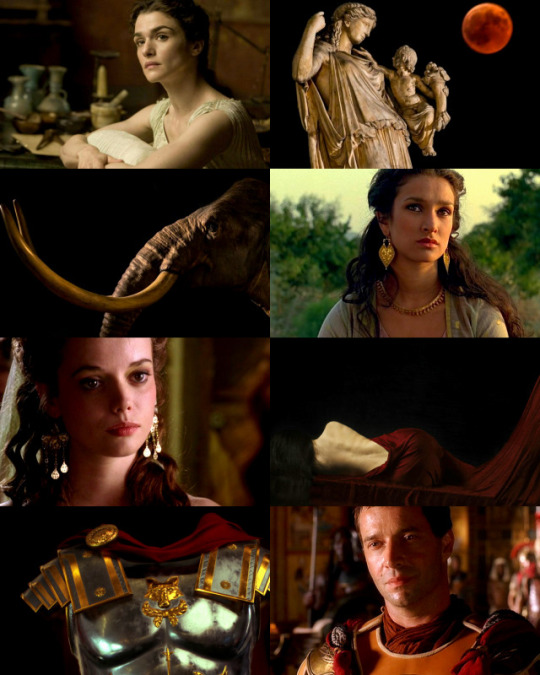
“My king is putting aside his wife. They say he already has another in mind.” England said it like a man trying not to sound frustrated. But it was clear to Portugal that he was. He had known the man long enough to see the feelings in his face.
Only after a dinner and light conversation had it finally come spilling out, as England got comfortable enough.
He asked, watching closely for a reaction, “How many is this now?”
England let out a very long sigh and said, “This is the fifth. That is not the worst part.”
He swallowed hard, like the most unpleasant truth was just on the tip of his tongue. Portugal prodded him gently, “What is worse?”
England ran one of his hands over his face, before finally saying, “I have met the lady, and she is only seventeen. She is practically a child.”
He looked pale and ill, like the concept of taking a teenager to bed was sickening him. Portugal said, offhandedly, “He sounds like my father.”
The blonde raised one eyebrow and said, “What do you mean?” Portugal picked up one of mostly empty wine glasses from the table and drained the dregs from it.
Then he said, “Have you ever questioned how he had so many sons? Or what happened to the women he bedded.”
He heard the sharp sting of bitterness in his voice. It was always there when he discussed Rome. But, it was safe to show it with England. The blonde shook his head, “My mother said he was an immoral tyrant, and I never thought more about it.”
Portugal put down the glass, which was now empty. He chewed on his own lower lip for a moment before he said, “Would you like to hear the story?”
England seemed to hesitate for a moment, like he was questioning whether it would be asking Portugal to recount pain. He knew him well enough to know that Rome was a sore subject. But, he felt like turning down the offer would be rude.
But, he finally nodded. Portugal shifted in his chair and said, “This is what I know from what I’ve found of him:
When he was young, they say he loved Ancient Greece. I have found some of the poems that he wrote for her, and he claimed it was the truest love he ever felt.
I can’t know if that was ever true.
Perhaps he did love her when they were married, or perhaps he did it for power. His life seemed to be a quest to always have more.
Greece gave him an heir. From what I can tell, Byzantium was the first son he ever had. He was elated to have a son, and celebrated it for the world to know. But, celebrations were always followed with restlessness for him. Once he got what he wanted, then he had to find something new to conquer.
No one knows when he first met my mother, Carthage. But I think he began to stray when he had a legitimate successor. He never wrote her beautiful poems, or gave her lavish gifts. I remember he would visit for a few days at a time, but keep to himself. He arrived and left without ceremony, rarely even asking to see me. There was no celebration for me or for Tony, or ever any acknowledgment that we existed.
After Tony was born, they started fighting. I remembered hearing the yelling through the walls. Though I never heard what they said clearly, I imagine she wanted him to acknowledge Tony and me as more than just bastards. It is what any mother would do for her sons.
She deserved better than him. She ruled the sea, and rode elephants to battle. Her intelligence and skill was unmatched, even if he thought he was the kind of the world.
She was too strong-willed for him, and he knew it. If he had married her, he would have been unable to control her. He couldn’t do that when she was just a mistress.
I know that Ancient Greece left him, and I imagine that she found out that he had two other children. That must not have rested well with her, and worried her about the position of her son. His absences would be enough for anyone to hope for better.
I do not know when Heracles was born, or who his father was. If he Is Rome’s son, then he wasn’t cursed with our father’s looks, or his temper.
The fighting between my mother and Rome just got worse, and my mother sent us away before it came to war between them. I remember her hugging us both before putting us on a boat set on a course for Iberia. It was the last time I saw her.
I know in my heart that she protected us from him. He was a pitiless man who killed her for insisting that Tony and I were given what we should have been. He did not want his heir to have to compete.
Now we will always be known as Rome’s bastards, and I know Tony resents that. I made peace with it years ago.
What could you expect from a man who murdered his twin brother? What could we really believe he would give us?”
He paused for a moment and then looked at England and said, “This is where it becomes relevant.”
England thought he heard pain when Portugal recounted Carthage’s fate. But, he dared not ask his friend. It was too much to push for more vulnerability, when what he was being given was already a gift.
Portugal continued, “With only one legitimate son, and an expanding empire, he decided that he needed more. Perhaps he began to understand that he was mortal, even with our long lives. No empire lasts forever.
He found a new bride named Veneti. I have heard that she was seventeen when he married her. I supposed he tired of strong women, and chose one he could dominate.
She bore him twins, who he swore were the spitting image of him and Remus. He thought it showed that the gods favored him, even when his empire started to wane. That’s when he chose Feliciano as his heir, even over Byzantium. He saw himself reborn and thought it was fate.
Ironic, don’t you think? He disinherited his eldest in secret, and still expected to be welcomed in Constantinople when he fled from Germania. He chose to vanish rather than face his end.
He thought as his sons we all needed to prove ourselves to him when he never proved himself capable of being a father. I would rather be my mother’s son than any child of his.”
Then he drew in a breath and stopped talking. England felt like this was the end of the story, and he would not pry.
He tried to change the subject back to the present, to prevent Portugal from delving too deeply into his feelings about his father. He said, “What do you think this all means for Henry? Rome’s empire fell to pieces after he died. I hope that will not happen to me.”
Portugal leaned forward onto his elbows and said, “It means that his most competent heir will be the last one he expects, and it may very well be the one that he refuses to acknowledge.”
-------------------------
APH Roman empire, Ancient Greece, Carthage, and Adriatic Veneti aesthetic
63 notes
·
View notes
Photo
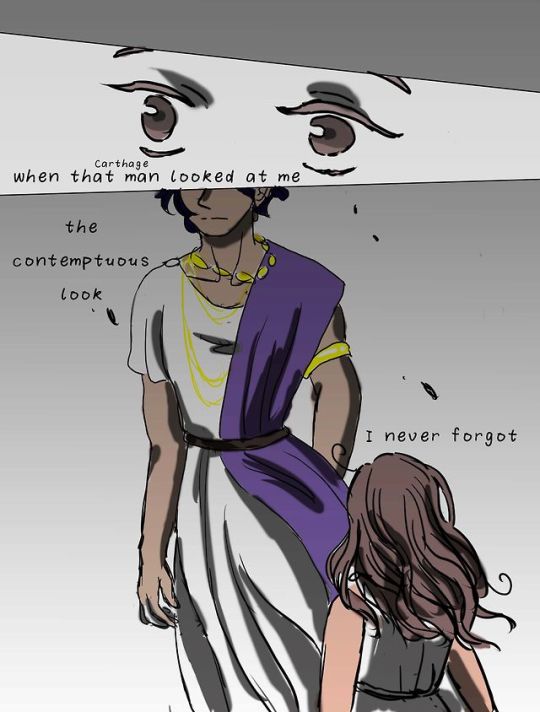
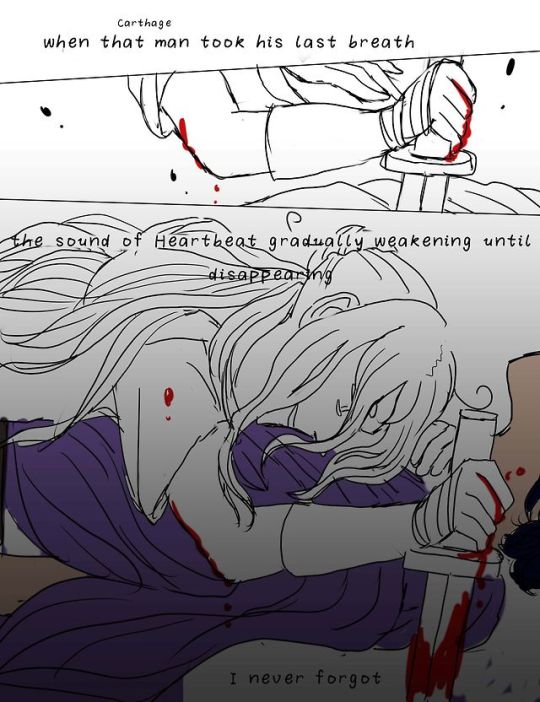
continue trying to translate my stuff to English, so sorry if the language is a bit of wired……
26 notes
·
View notes
Photo
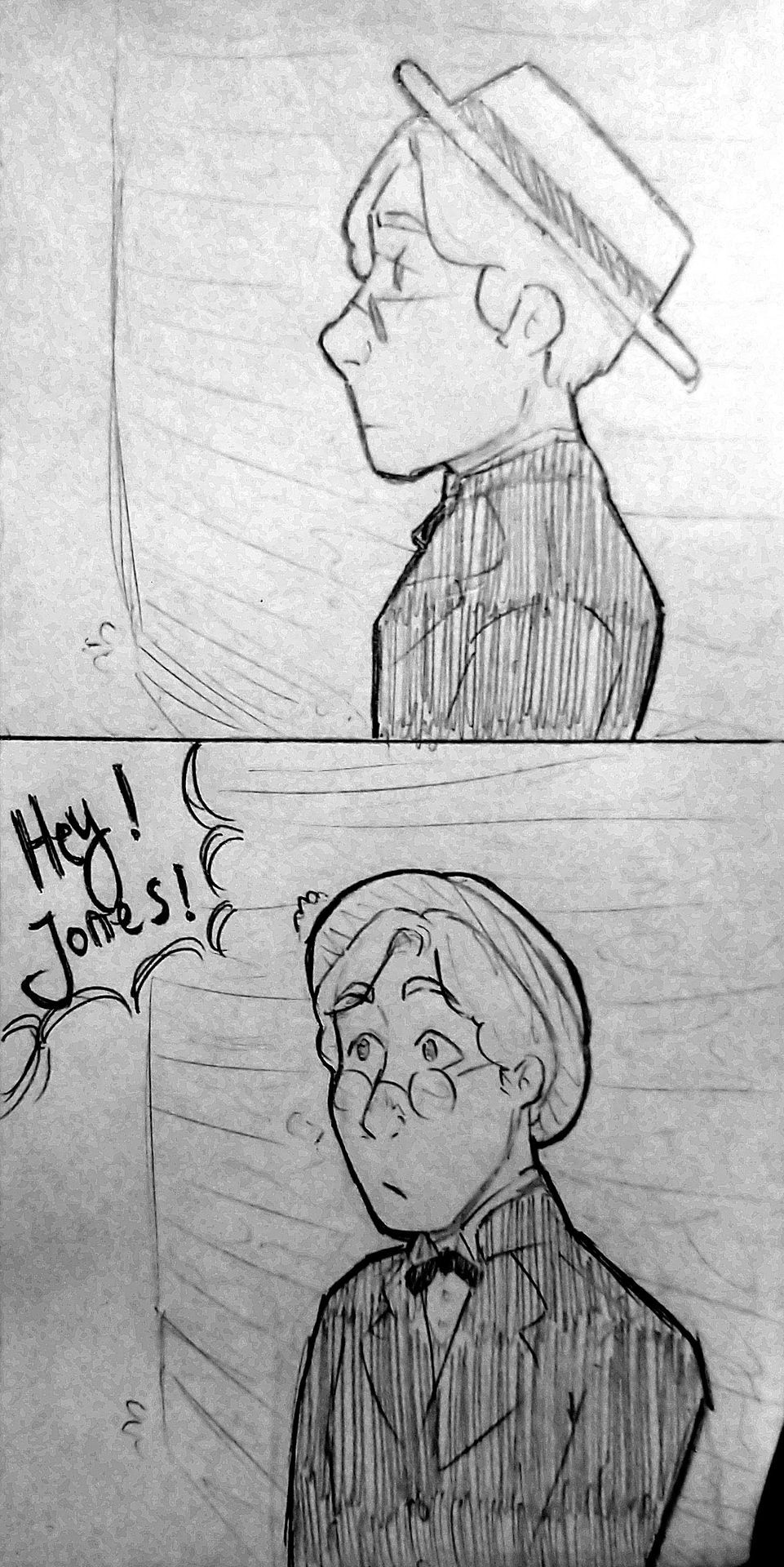
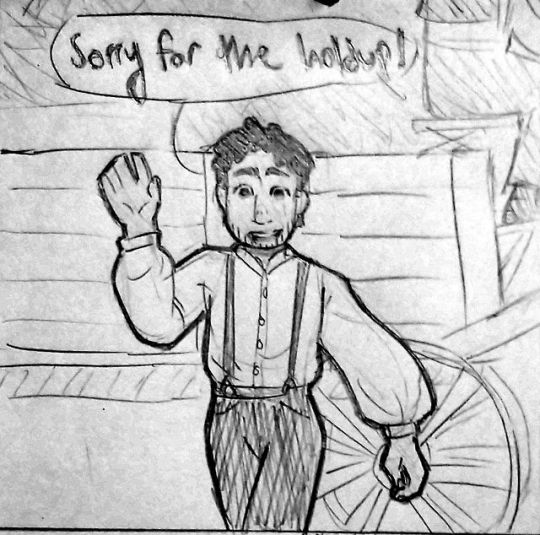
Matello: “Good to see you again!”
Alfred: “Yeah, of course! You too!”
M: “How was your trip?”
A: “Oh, not terrible.”
M: “The best it can be, then?”
A: “As it goes.”
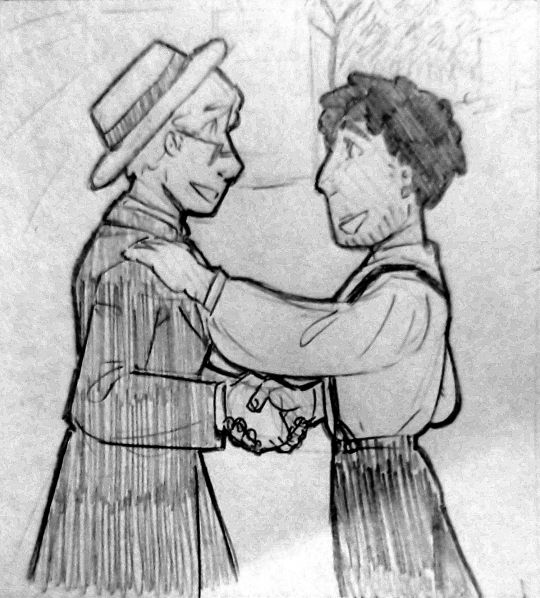
Part 1/3-? of the promised comic! And hey, look- another person! Introducing, Mr. Matello Barca. The guy who hired Alfred!
did i steal his design from @qarthadasht ? yes. yes, I did. go check them out! the aph ancients totally need more love.
//oof he’s supposed to look older than he does but guess what i drew him well and didn't want to re-do it.
#ask schoolmaster alfred#aph carthage#aph america#aph ancients#sma#plot#sma art#alfred f jones#hetalia#historical hetalia#aph
23 notes
·
View notes
Photo

it’s anysus’ birthday today, jan. 12th! he is turning 2833 baby years old. he’s baby
please stop by and give him some sweets, elephant trinkets, or aph rome’s head
28 notes
·
View notes
Photo

when you love elephants but romulus has been systematically stripping you of everything you hold near and dear... pwease give anysus a wawm cup of coffee he is so tiwed
@velveteen-mango tagged anysus in this post here and it’s also where you can get the real shirt from obvious plant!
#my art#ocs tag#aph carthage#aph rome#aph ancients#axis powers hetalia#hetalia fanart#creatorsofhetalia
68 notes
·
View notes
Text
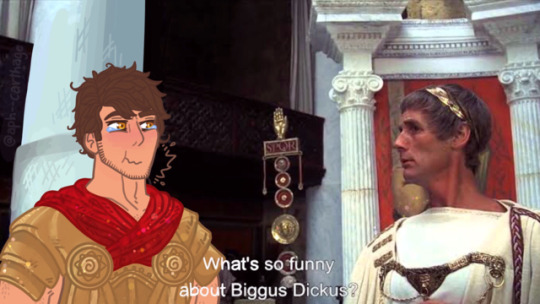
he got Biggus Dickus Energy
#aph rome#grandpa rome#click for higher resolution#ancientalia#aph ancients#life of brian#hetalia art#ancient history#aph--carthage#biggus dickus#pontius pilate#terry jones#history memes#foxy grandpa irl#punica fides
178 notes
·
View notes
Note
what's a weird fact abt ur ocs you havent talked abt before?
hmmmm here's a few!
Uganda's hair started falling out in the 70s from stress and he decided to go completely shaved- it's been slowly recovering since, but he still has it shaved bald out of habit
Tunisia's beauty mark is in the exact same place as Carthage's 👁👁
Oman crashed at Zanzibar's house for like. a decade or two when his empire fell apart
That eventually led to her house being the gathering place of the "Indian Ocean African+Middle East Old Man Nations" club, where Yemen, Oman, Somalia, and Ethiopia go to drink coffee and bitch @ each other (mostly the last two)
#hws uganda#hws tunisia#hws oman#hws zanzibar#hws carthage#hws yemen#hws ethiopia#hws somalia#ask#anonymous#hetalia headcanons#aph africa#hetalia#poor zanzibar
41 notes
·
View notes
Photo
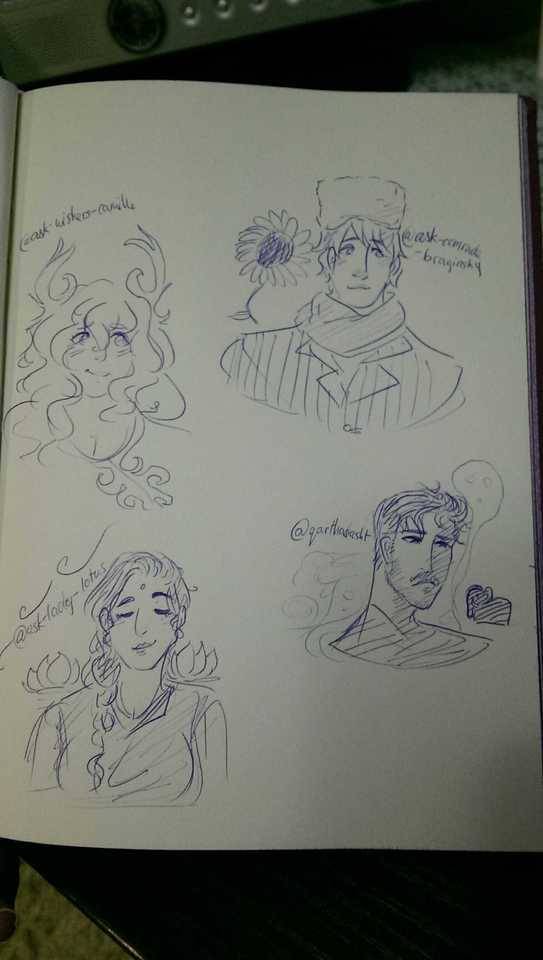
@qarthadasht I will need to stare at him more but I love him and him being a listless and mildly worrying ghost man is iconic! 🐘🐘 VANYA MY SUNFLOWER SON- It is always a pleasure to draw Aph Russia because I lowkey used to binge draw him. Happy holidays! @ask-comrade-braginsky Mimi! Those antlers are probably all kinds of wrong but she needs more smiling, please let other Mimi leave her with a strong heart! @ask-wishers-camille And M O M M Y !! Mother India, henlo, I love her, give her some calm and quiet, a pleasantly cool breeze and the scent of flowers as she suffers the December season pls and thank. @ask-ladylotus
67 notes
·
View notes